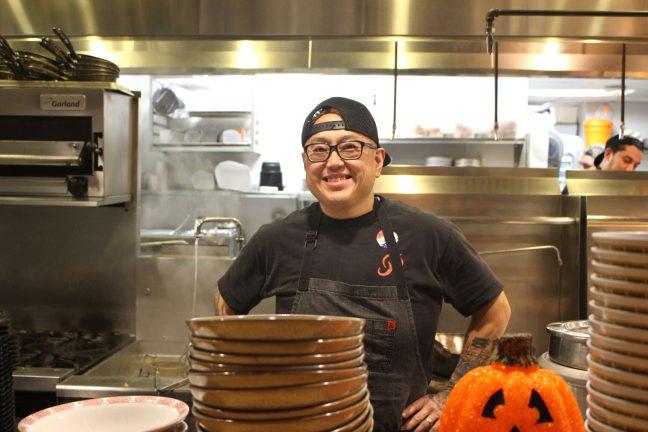Chef Tory Miller sat comfortably in the dining room of Estrellon, one of four Madison restaurants he owns and operates. His t-shirt read “Sujeo,” the name of another of Miller’s establishments. His drink of choice rested not in a cup, but in a small storage container meant for sauces and stocks.
Among upturned chairs in a restaurant that would later be filled with diners, Miller recounted how as a child he always had a job waiting for him among the burners and pans of his grandfather’s Racine diner. Miller’s siblings were offered the same opportunity, but they didn’t appreciate the romance of the kitchen the way their brother did.
Everything about the kitchen captivated him — the call and response between a chef and their staff, the creative process which takes a cook from concept to cuisine, the gratification from serving a handmade meal to an eager customer and the sight of warm food filling as many souls as it did stomachs.
Miller’s connection with food would teach him patience and grant him a daily creative outlet. But most of all, it would become his life’s calling, infiltrating every pocket of his existence.
Growing up as a utility cook in his grandfather’s kitchen led Miller not only to one of the finest cooking institutions in the country, but also to high-pressure environments where he worked with some of the greatest food minds of a generation.
He’s spent time at Eleven Madison Park, a New York City restaurant with three Michelin stars (a restaurant can’t earn a higher number) and ranked as the top restaurant on the planet in 2017. In 2012, a James Beard Award recognized Miller as the best chef in the Midwest. In the spring of this year, he competed against superstar chef Bobby Flay on Food Network’s “Iron Chef Showdown” — he won.
A chef of Miller’s caliber could succeed anywhere. He could open restaurants in the New York Citys and Chicagos of the world — cities known as food meccas. Yet here he was with a worn Green Bay Packers jacket draped over the back of his seat with a matching snapback hat turned backwards.
“Every opportunity I have now is to help put Madison on the map,” Miller said. “It’s in my nature to be as humble as I can … but all I want to do is work hard so people come to Madison.”
An unshakeable connection
Before he would write his first menu or audition for Food Network’s prolific cooking competition, Miller spent his days taking friends to his grandfather’s diner, where they’d order the burgers and shakes the restaurant was known for.
But unlike his friends, Miller saw the diner as more than a place to score a quick bite. The restaurant was a haven for him, somewhere that became as familiar as home. He took on every kitchen job he could, from flipping burgers to prepping vegetables.
Cooking television, the “‘OG’ food shows” as Miller called them, would always play in the background. Personalities like Julia Child and Emeril Lagasse were formative in his childhood. Their shows never consisted of drama-laden plots; there were no secret ingredients and no countdown clocks in sight. They were simply about the chefs maximizing an ingredient’s potential.
Miller didn’t need to be captivated by high-pace food media designed to retain viewers with a short attention span. The food held his attention without any outside stimulus.

Hazel Tang
Knowing cooking would serve a purpose in his life greater than a weekend hobby, Miller ditched Racine and enrolled in the French Culinary Institute in New York City, one of the nation’s most prestigious programs and the alma mater of his future opponent Bobby Flay. Miller said he had no qualms about his ability as a chef upon enrollment — he knew his talent deserved him a spot at the table.
“I want this to be my life, I’m here to work harder than everyone else. I was driven,” Miller said. “If you weren’t at my level, I’m gonna step over you and move up.”
Culinary school in many ways emulated the atmosphere of the professional kitchens in which Miller would eventually work. The program boasted a technique-driven curriculum and fostered within Miller a stringent respect for authorities who were unafraid to harshly criticize his dishes.
“I learned very early that you are to say, ‘Yes chef,’” Miller said.
His opportunity to create would come later. But while in school, his sole job was to take the recipes he was presented and execute them. Within the confines of that rigid model, his only opportunity to outshine fellow classmates stemmed simply from better cooking.
Amid the intensity of such a demanding model, Miller stood firm and confident, and his instructors took notice.
“My desire to learn more was always there, and that always set people apart,” Miller said. “If you want to learn, that’s step one through 10 [to succeed].”
While still in the middle of his academic career, an instructor recommended Miller for a job at the now-closed Judson Grill — a two-star, 180-seat establishment home to one of New York’s most revered meat stations. Miller, ever the proactive cook, accepted the position even as he juggled school, bills and any semblance of a sleep schedule.
By day, Miller worked at Judson in a low-level prep position — but his drive hadn’t changed a bit, even behind his “Midwest nice” temperament.
“I’d say, ‘Oh I’m just here to learn and work hard,’” Miller said. “But secretly I’m thinking, ‘I’m going to get to the top of this kitchen.’”
By night, Miller was still attending class. And on his days off from school, he was back at Judson. He didn’t sleep much, and working for $7.25 an hour, conversations with his landlord about why rent was short were no rarity.
But even on such a physically taxing regiment, Miller moved from the bottom of the totem pole to running the seven-protein meat station, an astronomical amount of ingredients by Miller’s measure. Each protein required a different preparation, which Miller executed well enough to earn him name recognition in the country’s most talent-rich cooking city.
“He has a lot of heart, and he understands that the best food comes out of a place that recognizes an interdependence with its farmers as well as its wait staff and dishwashers,” Piper said. “He’s an extremely collaborative chef.”
Miller recounted a particularly harrowing occasion where his head chef approached him with a bottle of basil oil Miller had made.
“I could tell it was discolored, I’d fucked it up, I’d rushed,” Miller said.
The chef poured the botched oil over Miller’s work surface — another chore added to his to-do list without question.
Instances like these were not uncommon, but they did not tarnish his reputation. Before long, he was promoted to banquet and special events sous chef, a position where creativity was finally encouraged. The trajectory of his career had seemingly reached a pinnacle: There he was, a small-town Wisconsin cook who’d grown up on burgers and fries making executive decisions in one of the most celebrated kitchens in the world. But Miller felt the name Eleven Madison Park overshadowed the ingredients that brought it fame.
Diners came to the Manhattan restaurant expecting spectacular meals, which Miller thought took focus away from the ingredients. He felt that customers appreciated the food not for its culinary content but because it had come from the kitchen of an elite restaurant.
Miller knew it was time to move on.

Hazel Tang
Considering the financial struggle of living in one of the country’s most expensive cities on a cook’s wage, Miller moved back to Wisconsin and sent out resumes across Madison, hoping to regain some of the proximity to food he’d lost in the buzz of the big city.
His phone lay dormant even after contacting many of the city’s elite establishment — until Odessa Piper, chef at L’etoile and a name he’d been encouraged to seek out, offered him an odds-and-ends job in her french-inspired kitchen.
Piper couldn’t afford to pay him full time, but knew her current chef de cuisine was expressing some ambivalence about the position and that Miller’s talent could not be squandered. Within three months, Miller was L’etoile’s new chef de cuisine.
“I think really good restaurants understand the reality that when you have a real treasure of a person, you do what you have to do to bring that person into your organization,” Piper said. “It took money, it took time. But it was worth it.”
Dual sustainability
Miller learned from Piper the importance of maintaining a healthy relationship with the people from whom his ingredients would originate. L’etoile had been, from the beginning, a farm-to-table restaurant. For many chefs, that means serving local ingredients which reflect the season.
But Piper’s relationship with her ingredients went a step further. She made sure she maintained a face-to-face relationship with the farmers who provided for her. This meant constant trips to the iconic Dane County farmers’ market.
Farmers at the Farmers Market: Stories behind everyone’s favorite vendors
Early in the mornings, Piper and Miller would set out to the market to decide the day’s menu, and before long, their creative energy would completely take over.
“Sometimes we would go to the farmer’s market together and talk about [ingredients]. And even before we pulled up our little wagon to the door [of L’etoile], we were just so excited we would go racing up the stairs and straight to the kitchen,” Piper said. “We had a creative short hand back and forth. We were so open to each other’s ideas.”
The collaborative effort and consistent communication with Wisconsin farmers is a philosophy Miller still embraces, and it expanded its reach with each new restaurant he opened.
In 2005, Miller took over for Piper as head chef at L’etoile. He expanded his business five years later, opening Graze, L’etoile’s gastropub neighbor. Sujeo, Miller’s casual, pan-Asian restaurant, opened in 2014 followed by Estrellon in 2015, an elegant, Spanish-style fixture serving tapas.
While each restaurant is distinct in its identity, the core culinary value among them is universal: respect the ingredient.
If Miller finds a particularly appealing, in-season batch of squash at the farmer’s market, the ingredient is sure to make an appearance in every restaurant. While the food at each restaurant reflects the culture that inspired them, the ingredients themselves are rooted in Wisconsin.
“[Cooking is] a community to me, it’s connecting you with the people you work with,” Miller said. “It starts with buying the ingredient from someone I can see and help — knowing that every food dollar I spend impacts that person.”
No idea is worth ridiculing at face value, Miller said. The trust he has in his staff gives way to a space where creativity is not defined with an asterisk — the privilege of creative expression is not reserved only for the head chef.
Miller is a chef, not a restaurant executive. He said cooking is all he wants to do in life, and he does so without the pursuit of personal glory. That means he’s in the kitchen every night — whether it be in one of his four restaurants, or at home making a delicious meal for his three kids.
“I tend to see this mark among truly great chefs — they’re great because they’re not full of ego,” Piper said. “No work was beneath him. He washed dishes, pots and pans, he prepped — he understood the importance of all of it.”
Miller still cleans, and while the gesture may be small in immediate impact, it’s representative of a man who isn’t interested in continuing the brutal environment he’d been subjected to in kitchens past. There would be no sabotage, no authoritarian regime and certainly no dumping of basil oil in his kitchens.
While the nature of his title necessitates a certain level of authority, his staff and mentor said his leadership style is never defined by stubbornness.
“He has a lot of heart, and he understands that the best food comes out of a place that recognizes an interdependence with its farmers as well as its wait staff and dishwashers,” Piper said. “He’s an extremely collaborative chef.”
Itaru Nagano, his chef de cuisine at L’etoile, said he’s worked for some truly talented chefs, but none run their kitchens the way Miller does.
No idea is worth ridiculing at face value, Miller said. The trust he has in his staff gives way to a space where creativity is not defined with an asterisk — the privilege of creative expression is not reserved only for the head chef.
“The reason I love my job is because I get to be creative. If I didn’t have that I don’t know what I would do,” Nagano said. “[Miller] believes in equality for everyone, which isn’t always seen in a kitchen.”

Hazel Tang
All of this — the welcoming environment, the unique opportunity for chefs to push boundaries, and a head chef who still ends the night wiping down the stovetop — serves a wider purpose.
Miller understands the work he does will not begin and end with him. He knows his staff will change over time, and the chefs who relocate will forge their own paths with his impact in tow.
“People have to want this job and to learn from you. You have to be the person they want to be like,” Miller said. “If you aren’t giving them that … you’re failing yourself as a chef, you’re failing your industry, you’re failing your team.”
Madison’s time
Thinking back to when he relocated to Madison, Miller said he thought his time here would only be a stepping stone to more fruitful opportunities. Like the majority of the country, he did not think of Madison as a city with a rich culinary tradition.
But Miller is dedicated to reversing that perspective.
When Food Network asked Miller if he’d be interested in appearing on “Iron Chef Showdown,” in which a challenger competes against a mystery celebrity chef to create the best five-course meal in an hour, he was skeptical of pursuing the opportunity because he assumed a chef from Wisconsin would never be chosen.
Much to Miller’s surprise, he soon stood face-to-face with Iron Chef Bobby Flay.
Nagano, his sous chef, whispered to Miller before the competition began that Flay wins around 88 percent of the time. But Miller and his team won the episode, defeating Flay in a battle of bison.
Still, Miller’s assessment of the television appearance focused not on his victory but on elevating Madison’s reputation.
“I think about what it says about Madison and what it says about Wisconsin,” Miller said. “We have a lot going on here that should be recognized.”
Even after traveling and eating globally in her soft retirement, Piper maintains that Miller’s cooking is pushing Madison into the national spotlight.
“I think Madison is right up there with little boroughs of New York and San Francisco,” Piper said. “My life now takes me to restaurants all around [the world] so I know of what I speak, and the service at L’etoile is jaw-droppingly warm and gracious … It’s like the food.”
For new and old Badgers alike, here are the best places to eat off-campus
Miller’s impact is twofold: He has not only brought attention to Madison as a culinary haven by pioneering four exceptional kitchens, he has also introduced to a new wave of chefs the idea that success comes not only from tradition.
Desiree Nudd, who worked as Miller’s executive sous chef at Estrellón, is now at Somerset, a Chicago restaurant that employs multiple award-winning chefs. She said witnessing Miller’s dedication to local ingredients has impacted how dishes at Somerset are designed. The restaurant now seeks ingredients from origins in close proximity to Chicago.
“His love for local food and local farmers opened up my eyes to see how much he loves to support the food that’s in Wisconsin,” Nudd said. “I’m more comfortable being myself because I’ve worked with Tory.”
When it’s time for Miller to hang up his apron for the final time — and that day may never come — he hopes his legacy extends beyond the number of successful restaurants he opened. For Miller, television appearances, prestigious awards and heaps of industry praise feel nice only for a moment.
What fuels his seemingly unstoppable engine comes down to the plate in front of him. No dish is any more important than the next, and that’s because Miller believes they each hold equal value. When a meal is placed before a customer at any one of Miller’s restaurants, that dish exemplifies a culmination of his values — and that, unlike his menus, will never change.
“I always want people to leave full,” Miller said. “… full of the knowledge that they ate at a restaurant that cares about their food and the ingredients around them.”














